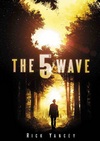I’m in kind of a rush posting this, not a lot of time to proofread/make sure it makes sense. If you see a problem, leave me a note in the comments, I’ll fix it. Thanks!
—–

Doubleblind by Ann Aguirre
My rating: 3 of 5 stars
There’s a danger when reading serialized fiction in letting too many months — or potentially more dangerous — too many books pass between volumes. That’s exactly what happened between Wanderlust and Doubleblind for me. I spent far too much time in the first 50 pages or so trying to remember characters/events — even with a pretty well-done “let’s get reacquainted with everyone” chapter 1, that still moves the plot forward.
I’m not sure how much that effected my enjoyment of the book, but it did make it unreasonably difficult to get into. But that’s my fault, not Aguirre’s. I also was put off by Jax’s too frequent internal rehashing of the state of March and their relationship. That eventually slowed down — due to plot and (gasp!) character development. There’s one UF heroine who has similar problems with the internal rehashing, and Jax reminded me far too much of her for the first half of the book or so, but Aguirre does the right thing — she has Jax move on from that (by her own volition, as well as events around her), the character I kept comparing her to only grows when forced to in the last quarter of the book, and then spends the bulk of her next book complaining/trying to get back to where she was.
Jax being able to move on, and change as change is warranted (not changing for changes’ sake), makes me like her and her creator all the more.
And really, that’s what this series has been about — this book more than the rest — Jax shedding the party-girl, reckless youth, part of her, and maturing. Making determined choices to not be who she used to be, but instead thinking about her decisions and actions, taking responsibility of the outcomes, and working for the betterment of her crew, her employer, and humanity as a whole (though, she’ll settle for the betterment of her crew). Actually, in this, she’s reminding me a lot of Izzy Spellman (see my review of her latest).
Now, while this is what the book is really about (IMHO), there’s all this other plot-y stuff going on. Jax and her crew (and some others) are on a planet populated by an insectoid culture, trying to bring them into their planetary alliance while dodging threats from their hosts as well as from within (including, possibly, treachery of the worst kind). Oh, and this fledgling planetary alliance is trying to get its sea legs, while fighting off organized crime with more muscle than the government, not to mention the previous ruling power trying to get things back under their control. All the while, a nearly unstoppable alien force is starting to wage war against humanity, who needs the Jax’s mission to be a success so they can have a shot in the oncoming war.
And seriously, you don’t need the character development, the personal growth elements of this — you just need the politics, the intrigue and the impending doom to get a book to work (see: A Song of Ice and Fire). But you add in what’s happening to Jax, as well as her closest friends, and you’ve got yourself one rockin’ SF adventure.
I’m sure I won’t wait as long for book #4. I’m not that stupid.
 Redshirts
Redshirts











